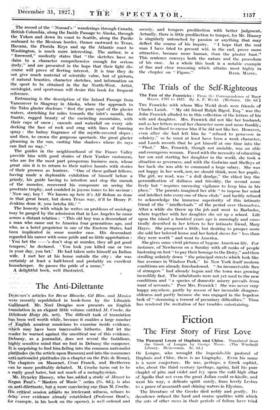The Trials of the Self-Righteous
The Fate of the Fenwicks : From thl Correspondence of Mary Hayes, 1797 to 1827. By A. F. Weld. (Methuen. 12s. 6d.) TIIE Fenwicks with whom Miss Wedd deals were friends of Charles Lamb. "My old friend Ralph Bigod, Esq." was the John Fenwick alluded to in this collection of the letters of his wife and daughter. Mrs. Fenwick did not like her husband, and as her letters reveal her character more and more frankly, we feel inclined to excuse him if he did not like her. However, even after she had left him he "refused to persevere in sobriety," so he must at least have been a weak character, and Lamb records that he got himself at one time into the
Fleet." Mrs. Fenwick, though not amiable, was an able and courageous woman. Faced with the necessity of educating her son and starting her daughter in the world, she took a situation as governess, and with the Godwins and Shelleys at her back she was able to command a large salary. She was not happy in her work, nor, we should think, were her pupils. The girl, we read, was "a dull drudge," the eldest boy the personification of dullness and frivolity, the second more lively but "requires unceasing vigilance to keep him in his place." The parents imagined her able "to impose her mind and intellect into-every one of these clods" and tacitly refused to acknowledge the immense superiority of this intimate friend of 'the " intellectuals " of the period over themselves. After a while she threw up the job and went to Barbados, where together with her daughter she set up a school. Life upon the island a hundred years ago is amusingly and caus- tically described in her letters to her intimate friend, Mary Hayes. She prospered a little, but desiring to prosper more she sold her beloved house and her hated slaves for " less than they were worth" and went to America.
She gives some vivid pictures of bygone American life. For instance, of Newhaven on a Sunday with all ranks of people hastening on foot "to pay their homage to the Deity," and then strolling sedately down "the principal streets which look like fine avenues in Windsor Park." In New York itself modern conditions are already foreshadowed. "An inconceivable flux of strangers" had already begun and the town was growing incredibly fast. The inhabitants were not yet used to the new conditions and "a species of domestic misery prevails from want of servants." Poor Mrs. Fenwick! She was never very happy anywhere, partly by reason of her incurable disagree- ableness and partly because she was engaged in the hopeless task of " stemming a torrent of pecuniary difficulties." Time has rendered the recitation of her troubles entertaining.


























 Previous page
Previous page